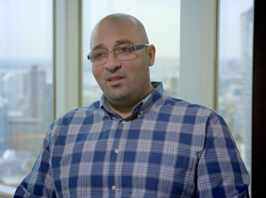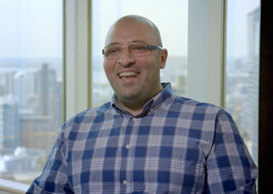|
In a competitive job market and being new to Canada, many Syrian refugees, like other skilled newcomer professionals, find it difficult to secure a good job and connect to employers that are hiring.
This was the catalyst for the creation of the Syrian Refugees Jobs Agenda in December 2015, a roundtable convened by Senator Ratna Omidvar, then Executive Director of the Global Diversity Exchange (GDX) at Ryerson University’s Ted Rogers School of Management. Roundtable members are representatives from different sectors in the Greater Toronto Area – business, government and non-profit organizations – all focusing on identifying employment opportunities for Syrian newcomers and matching their talent to the needs of employers.
Like many refugees, finding a safe place to live for his family was Wael’s number one priority. He found that when he came to Canada.

Wael Haddad, arrived in Canada January 2016
“I lost everything while in Syria – everything,” says Wael. “Canada was a dream. I wasn’t expecting to live in Canada…The first moment we cross the ocean and cross the border into Canada, I’m telling my wife ‘are we here?’”
His next priority was being able to live and work so that he could provide for his children and give back to the country that so generously opened its arms to him.
“At first my private sponsor they help me out…because I have nothing… I don’t have work, I don’t have money…they help me to resettle,” explains Wael.
An accountant by training, Wael quickly realized that finding a job that was compatible with his knowledge and skills required some extra help.
“There has been an outpouring of support to welcome Syrian newcomers from all sectors, public and private,” says Senator Ratna Omidvar, founding Executive Director of the Global Diversity Exchange (GDX). “But missing was a clear focus on helping them find the right employment to match their skills and capabilities.”
“Skilled immigrants and refugees present a great opportunity for our economy and for employers,” says Senator Omidvar. “As years go by a great many jobs could go unfilled across the country because of a lack of qualified candidates. I believe the effectiveness of immigration depends on attracting skilled immigrants and ensuring they find work that is consistent with their education and ability. Smart immigration combined with maximizing potential – that’s a powerful combination.”
It’s been a little over one year since the roundtable first convened. And its had many positive and measurable impacts on identifying and creating employment opportunities for Syrian newcomers that arrived as refugees.
Key Highlights:
- Job Fair – members of the roundtable put together a job fair in June that included 24 employers with pre-identified vacant positions and an intent to enthusiastically look for candidates to fill those vacancies. Many of the Syrian newcomers who participated were presented with their very first job opportunities in Canada.
- Construction Trades Program – roundtable members ACCES Employment, in partnership with the Labourers’ International Union of North America (LiUNA!) and the Refugee Career Jumpstart Project (RCJP) created an initiative to support Syrian jobseekers’ entry in construction-related occupations. Participants receive sector-specific language training, pre-apprenticeship opportunities, and direct access to jobs in the construction trade industry.
- Syrian Refugee Fund Project Grant – a sub-committee that formed from the roundtable led to a new project between Magnet, ACCES Employment, TRIEC and the United Way of Toronto and York Region (UWTY). The project includes: the creation of an employment network hub for Syrian refugees, and developing online tools to support the integration of Syrian refugees into the Canadian workplace.
Employment focused and action oriented, the diverse network of 40 organizations from both private and public sector is a successful strategic effort and is still going strong. The Kick-Starting Employer Action guide is a simple, easy to follow resource to help other communities start similar initiatives. In the guide you will find the roundtable makeup, roles and responsibilities, desired outcomes and ingredients for success. There is also a snapshot of how newcomers can address labour market needs in key sectors – with quotes from participating members.

When asked about the employment support he received, Wael says, “They [non-profit organizations] teach you how to find a job…how to write your resume…they teach you about workplace connections…how to do your interview.” Wael continues that “this was very important to get into the market”. Attending the workshops and training helped Wael “to be part of society.”
“As of now I’m super happy,” expresses Wael. “So excited to see more from Canadian culture. I’m currently working and improving myself. Now I’m trying to give the maximum. I’m still young. Still have the power. And every day I wake up I say ‘thank God I’m in Canada.”
Read more The Kick-Starting Employer Action guide
Watch now The video of Wael Haddad speaking about his experiences.
